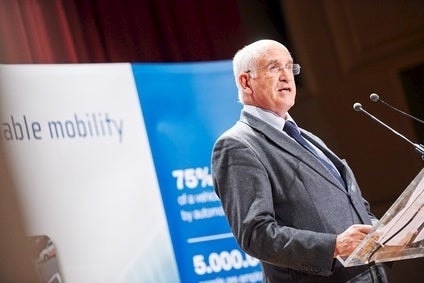
European automotive supplier body, CLEPA, says ever-tougher CO2 regulations are driving the industry to significantly improve efficiency and that the sector is prepared for a future tightening of goals.
Automakers are required to ensure their new vehicle fleet does not emit more than an average of 130g of CO2 per kilometre by 2015 and 95g by 2020-2021, with a recent report by PA Consulting Group suggesting some premium automakers will fail to meet the targets, triggering potentially substantial fines.

Discover B2B Marketing That Performs
Combine business intelligence and editorial excellence to reach engaged professionals across 36 leading media platforms.
Indeed, at CLEPA’s Annual Reception in Brussels last week, Climate and Energy Commissioner, Arias Cañete hinted at yet further and stricter emissions rules. “We cannot rest on our laurels,” said the Commissioner. “That is why the EC has started to reflect on new targets.”
The Commissioner noted transport accounted for around a quarter of greenhouse emissions, with “the vast majority” of this originating from road transport, but CLEPA insists the industry is actively addressing the issue.
“Regarding European Union CO2 legislation for passengers cars, it has largely been a success in driving innovation,” said CLEPA president, Arnaud de David-Beauregard at the Annual Reception.
“CLEPA members are developing a wide range of technologies for further CO2 regulations. We see additional, higher efficiency for international combustion engines and increasing market share for alternative powertrain vehicles.
“CLEPA members are committed to remaining leaders in CO2 reductions.”
The CLEPA president also added CO2 regulations twinned with CO2 targets should be investigated as part of a “two pillar approach.”
Turning to automated driving, David-Beauregard noted such technology could bring “tremendous social benefits” and would have CLEPA’s backing.
“Consumer needs, sustainability, safety and energy efficiency are clear objectives of CLEPA,” he added.






